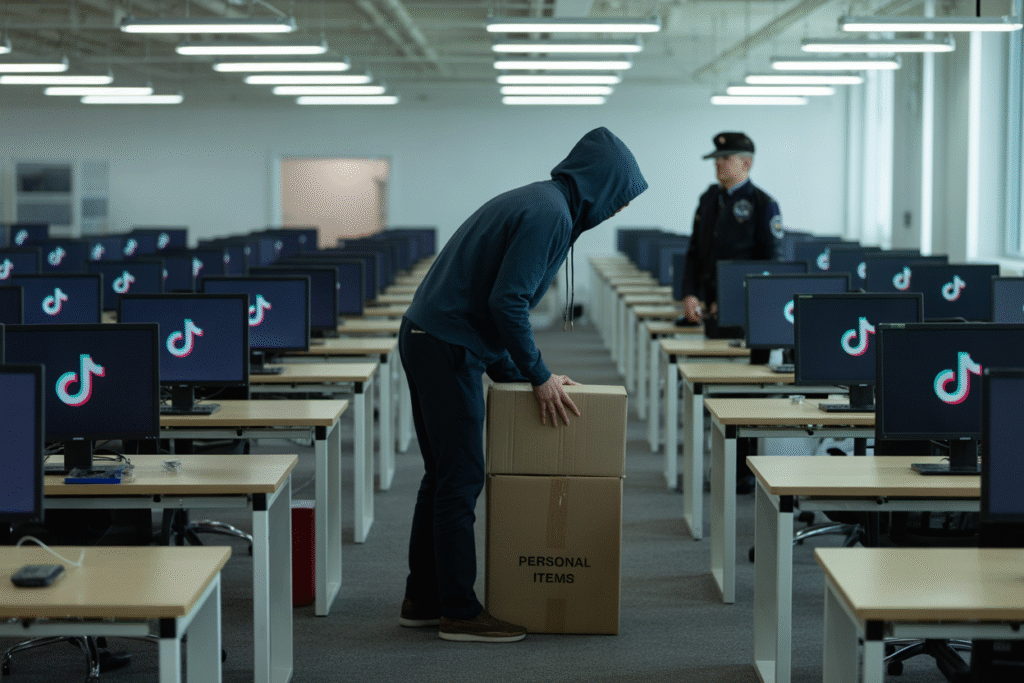Inside TikTok’s plan to swap human moderators for AI—why 800 workers could lose their jobs and why the internet is furious.
Imagine waking up to find your job replaced by an algorithm. That’s exactly what’s happening at TikTok right now. In the past three hours, the company quietly confirmed it’s accelerating AI-driven content moderation, and hundreds of human moderators are being shown the door. The move is framed as progress, but it’s sparking a firestorm over job displacement, ethics, and the future of online safety.
The 3-Hour Headline That Shook the Internet
At 09:12 GMT today, TikTok posted an internal memo that leaked within minutes. The memo outlined a plan to consolidate Trust and Safety teams in London and Southeast Asia, shifting 85 % of moderation tasks to AI systems. Within an hour, #TikTokLayoffs was trending worldwide. Employees described the mood as “eerie silence” followed by Slack messages full of crying emojis. One moderator told me, “We trained the AI that’s now replacing us.” The speed of the announcement left unions scrambling to respond, and by 10:30 GMT the CWU had called it “corporate greed dressed up as innovation.”
800 Jobs, 3 Continents, 1 Algorithm
Here’s the raw math. Roughly 800 content moderators across the UK, Malaysia, and the Philippines are affected. The AI system—nicknamed “Sentinel”—already handles 60 % of rule-breaking post removals. TikTok wants that at 85 % by year-end. Sentinel was trained on millions of human-reviewed clips, learning to flag violence, hate speech, and child endangerment. But insiders say the model still struggles with cultural nuance. A former moderator shared a leaked dashboard showing Sentinel mislabeled a Māori haka as “violent extremism.” The company insists the error rate is under 3 %, yet critics argue that 3 % of a billion daily uploads is still 30 million mistakes.
Why the Ethics Debate Just Exploded
The ethical flashpoints are stacking up fast. First, there’s the trauma argument. Human moderators absorb graphic content daily; AI doesn’t. TikTok claims Sentinel protects workers from PTSD. Unions counter that workers weren’t offered mental-health buyouts—just pink slips. Second, there’s bias. Sentinel was trained predominantly on English-language data, raising red flags for non-English communities. Third, accountability. If Sentinel misses a suicide video, who’s liable? TikTok points to the UK’s Online Safety Act, which fines platforms up to 10 % of global revenue for failures. Critics say that incentivizes platforms to prioritize speed over accuracy. Finally, there’s the reskilling myth. TikTok promises internal redeployment, yet leaked HR slides show only 12 % of affected workers qualify for new AI-training roles.
What Happens Next—Three Possible Futures
Future 1: Regulatory Crackdown. The EU is already drafting stricter AI-moderation rules. If Sentinel’s error rate triggers fines, TikTok could be forced to re-hire humans. Future 2: Hybrid Model. Some experts propose a 70-30 split—AI handles volume, humans handle edge cases. TikTok insiders say that’s the unofficial backup plan. Future 3: Domino Effect. Meta and YouTube are watching closely. If TikTok’s cost savings prove massive, expect copycat layoffs within months. Meanwhile, affected workers are organizing on Discord servers with names like “Sentinel Survivors.” They’re sharing résumé tips and crowdfunding legal fees. One moderator told me, “We’re not against AI—we’re against being discarded like outdated hardware.”
Your Move, Reader
So, what can you do right now? If you’re a creator, audit your old videos—Sentinel might be retroactively flagging them. If you’re a user, report any weird takedowns; human appeal teams still exist—for now. If you’re an investor, watch TikTok’s Q4 earnings call for mentions of “operational efficiency.” And if you’re simply furious, sign the Change.org petition launched two hours ago; it’s already at 40 k signatures. The algorithmic future is here, but the conversation about who gets left behind is just getting started.


